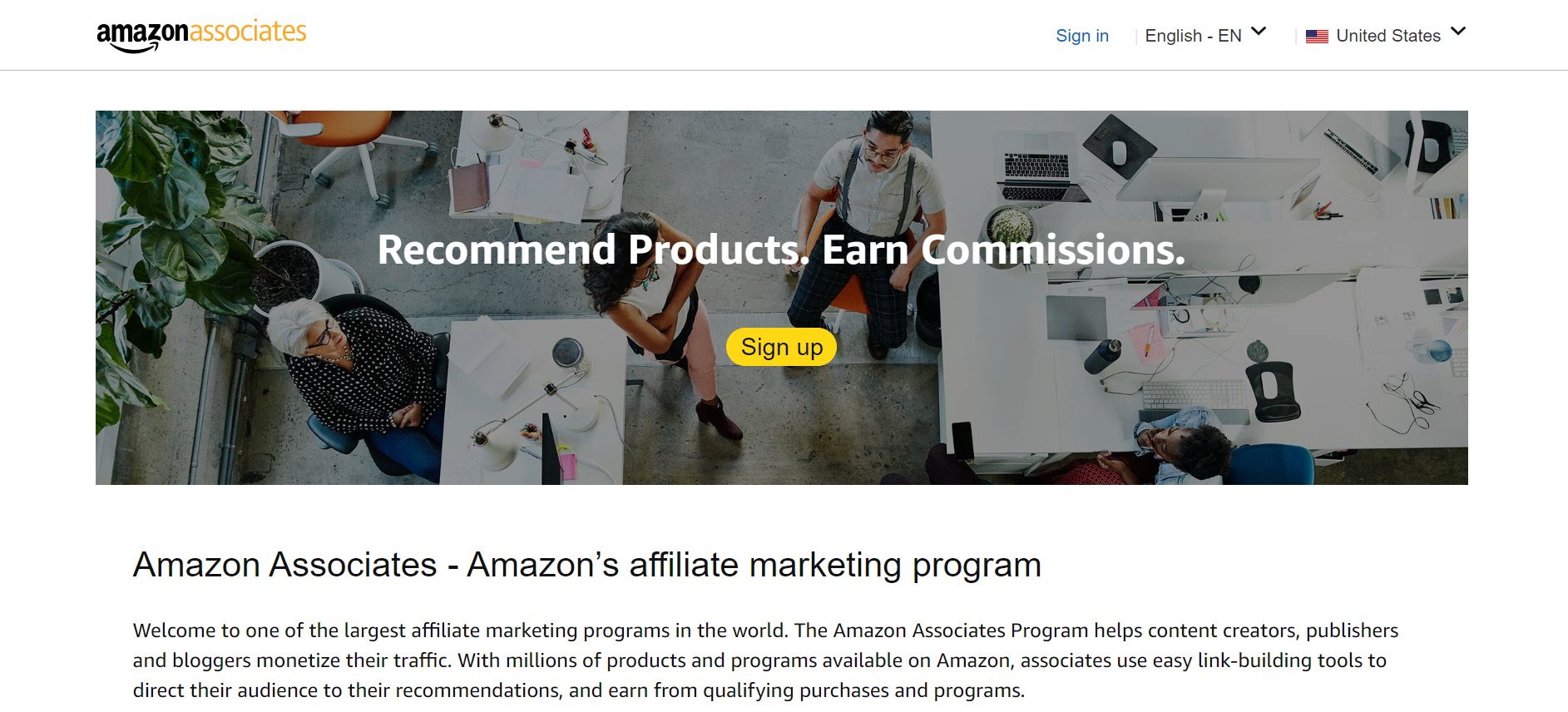Affiliate marketing is a results-driven strategy where businesses compensate affiliates for driving traffic, leads, or sales through their promotional efforts. This model has grown immensely in recent years, thanks to its efficiency in expanding brand reach and generating revenue without requiring upfront advertising costs.
What is Affiliate Marketing
Affiliate marketing is a performance-based marketing strategy where businesses reward affiliates for driving traffic or sales through their marketing efforts. This approach has gained significant traction in recent years, primarily due to its effectiveness in expanding brand reach and generating revenue without upfront costs.
Affiliates promote products or services through various channels, including blogs, social media, and email marketing, earning commissions based on their performance. The significance of affiliate marketing lies in its ability to create a win-win situation for both businesses and affiliates. Companies can leverage the networks of affiliates to tap into new customer bases, while affiliates can monetize their platforms by promoting products they believe in.
Criteria To Select
Choosing the right affiliate network is crucial for both businesses and affiliates. A well-structured affiliate network not only facilitates seamless transactions but also enhances the overall experience for all parties involved. The right network can provide valuable resources, robust support, and a transparent commission structure that motivates affiliates to perform better. Therefore, understanding what to look for in an affiliate network is essential for maximizing the potential of affiliate marketing.
Commission Structure
The commission structure is one of the most critical factors when evaluating an affiliate network. It defines how affiliates earn money and can significantly impact their motivation and performance. Here are the primary types of commission structures commonly found in software affiliate networks:
- Cost Per Click (CPC): Affiliates earn a commission based on the number of clicks generated through their referral links, regardless of whether a sale occurs. This model is advantageous for driving traffic but may not be as lucrative as other models since it does not guarantee sales.
- Cost Per Action (CPA): In this model, affiliates receive a commission when a specific action is completed by the referred customer, such as signing up for a newsletter or making a purchase. CPA is beneficial for software companies looking to acquire leads or customers without upfront costs.
- Cost Per Sale (CPS): Affiliates earn a percentage of the sale amount when a referred customer makes a purchase. This model aligns the interests of both the business and the affiliate, as both parties benefit from successful transactions. CPS is particularly popular in software affiliate programs because it directly ties compensation to performance.
Understanding these commission structures helps affiliates choose networks that align with their promotional strategies and financial goals.
Payment Methods
Another essential aspect to consider when selecting an affiliate network is the payment methods available for payouts. A flexible payment system ensures that affiliates can receive their earnings conveniently and on time. Common payment methods include:
- Direct Bank Transfers: Many networks offer direct deposits to affiliates’ bank accounts, providing a straightforward way to receive payments.
- PayPal: This widely used online payment platform allows quick transfers and is often preferred by affiliates due to its ease of use.
- Checks: Some networks still offer traditional checks as a payment option, although this method may be slower than electronic transfers.
- Cryptocurrency: As digital currencies gain popularity, some networks are beginning to offer cryptocurrency payments, appealing to tech-savvy affiliates.
Choosing an affiliate network with diverse payment options ensures that affiliates can select the method that best suits their needs, enhancing their overall experience.
Support and Resources
The level of support and resources provided by an affiliate network plays a vital role in its effectiveness. Quality support can significantly impact an affiliate’s success by helping them navigate challenges and optimize their strategies. Here are some key support features to look for:
- Dedicated Affiliate Managers: Having access to dedicated managers who can provide personalized assistance and guidance is invaluable for affiliates. These professionals can help troubleshoot issues, offer insights into best practices, and provide tailored recommendations based on performance data.
- Training Materials: Comprehensive training resources such as webinars, tutorials, and guides equip affiliates with the knowledge they need to succeed. Networks that invest in educational content demonstrate their commitment to helping affiliates grow.
- Marketing Tools: Providing affiliates with access to banners, landing pages, and other marketing materials simplifies the promotion process. Well-designed marketing tools can enhance an affiliate’s ability to drive conversions effectively.
- Community Support: An active community forum or group allows affiliates to connect with each other, share experiences, and seek advice. This sense of community fosters collaboration and helps affiliates learn from one another.
Support and resources are critical components that contribute to an affiliate’s success within a network.
Network Reputation
Assessing the reputation of an affiliate network is essential for ensuring credibility and reliability. A well-regarded network not only attracts high-quality affiliates but also fosters trust among partners. Here are some ways to evaluate an affiliate network’s reputation:
- Reviews and Testimonials: Researching online reviews from current or former affiliates provides valuable insights into their experiences with the network. Positive testimonials often indicate a reliable network that values its partners.
- Industry Recognition: Awards or recognition from industry organizations can signal that a network is respected within the affiliate marketing community. Networks that have received accolades demonstrate their commitment to excellence.
- Transparency: A reputable network should be transparent about its commission structures, payment terms, and policies. Clear communication fosters trust between the network and its affiliates.
- Performance Metrics: Analyzing performance metrics such as average conversion rates and payout timelines can help assess a network’s reliability. Networks that consistently deliver strong results are more likely to be trustworthy partners.
10 Best Software Affiliate Networks in 2026
Software affiliate networks provide a unique opportunity for marketers to earn commissions by promoting software products and services. These networks connect software developers and companies with affiliates who can drive traffic and generate leads. Below are ten of the best software affiliate networks, detailing their unique features, commission structures, and pros and cons.
- CJ Affiliate
- ShareASale
- Rakuten Marketing
- ClickBank
- Impact
- FlexOffers
- Amazon Associates
- Awin
- AvantLink
- PeerFly
1. CJ Affiliate

Overview and Key Features
CJ Affiliate, formerly known as Commission Junction, is one of the largest and most reputable affiliate marketing networks globally. It connects thousands of advertisers with a vast pool of publishers looking to promote various software products.
Key Features:
- Extensive network of advertisers, including many well-known software brands.
- Comprehensive reporting tools that provide insights into clicks, conversions, and overall performance.
- User-friendly interface that allows affiliates to easily navigate the platform.
Pros and Cons
Pros:
- Established reputation in the industry with a long history of successful partnerships.
- Access to high-quality software products from reputable brands.
- Strong support resources for affiliates.
Cons:
- Some programs may require approval before affiliates can promote them.
- The platform can be complex for beginners due to its extensive features.
2. ShareASale

Overview and Key Features
ShareASale has been in operation since 2000 and is known for its user-friendly interface and diverse range of affiliate programs. It offers various software products through multiple advertisers.
Key Features:
- Access to thousands of merchants offering different types of software solutions.
- Real-time tracking tools that help affiliates monitor their performance effectively.
- No upfront costs to join as an affiliate.
Pros and Cons
Pros:
- Easy-to-navigate platform with a variety of product offerings.
- Reliable payment schedule with timely payouts.
- Strong reputation among affiliates for quality support.
Cons:
- Limited international options compared to other networks.
- Some merchants may have lengthy approval processes.
3. Rakuten Marketing

Overview and Key Features
Rakuten Marketing is a global affiliate marketing network that connects brands with publishers across various industries, including software. It emphasizes building strong partnerships between advertisers and affiliates.
Key Features:
- Global reach allows affiliates to promote software products from international brands.
- Advanced analytics tools provide detailed insights into performance metrics.
- Custom solutions for brands help optimize their affiliate strategies.
Pros and Cons
Pros:
- Strong brand partnerships enhance credibility for affiliates.
- Comprehensive support system available for both advertisers and publishers.
- Innovative technology solutions improve campaign effectiveness.
Cons:
- Complex setup process may be challenging for new users.
- Higher minimum payout thresholds compared to some competitors.
4. ClickBank
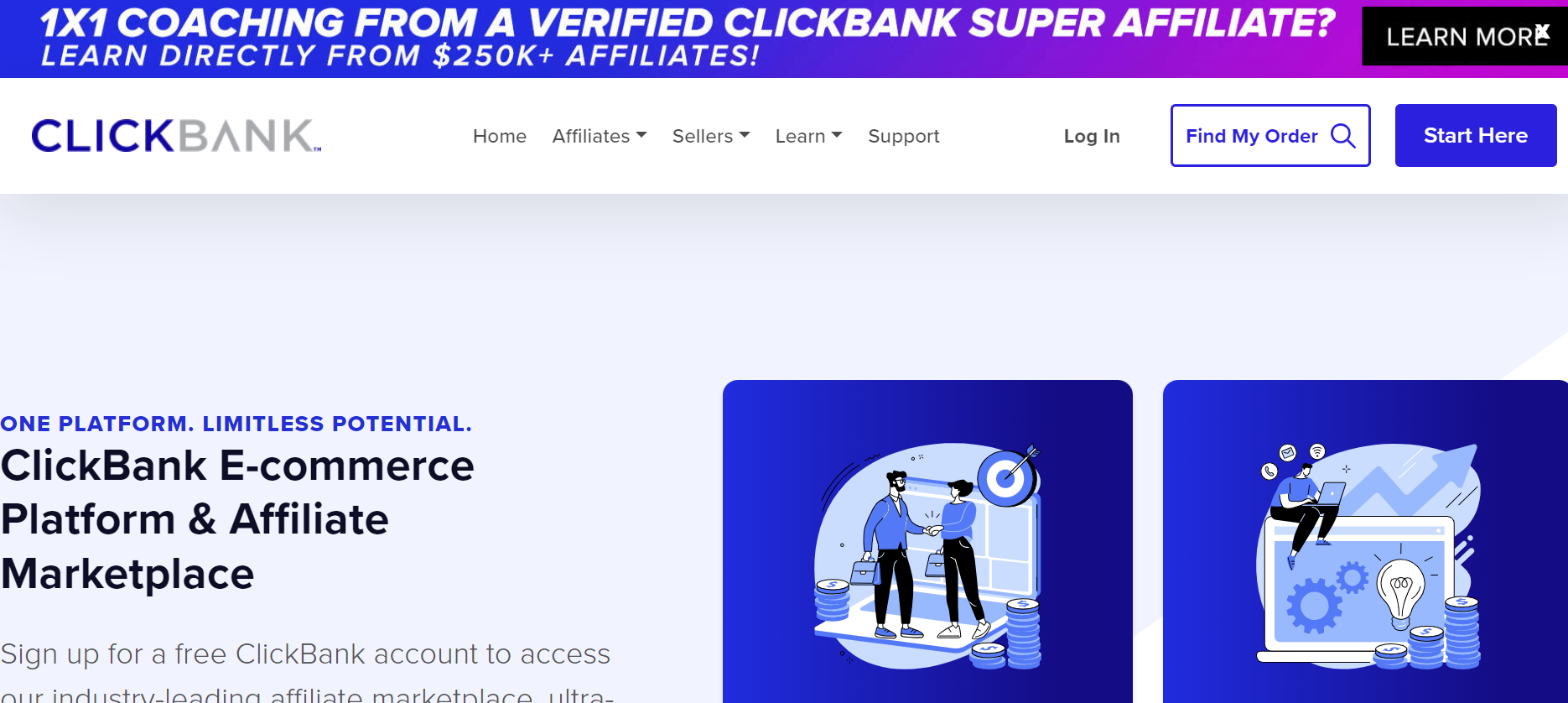
Overview and Key Features
ClickBank is a well-known digital marketplace that specializes in digital products, including software. It has a user-friendly interface that allows affiliates to easily browse available offers.
Key Features:
- High commission rates, often ranging from 50% to 75% on digital products.
- A wide variety of software products available across multiple niches.
- Instant access to promotional materials such as banners and links.
Pros and Cons
Pros:
- High earning potential due to generous commission rates.
- No approval process required for most products; affiliates can start promoting immediately.
- Easy-to-use platform with comprehensive support resources.
Cons:
- Quality of products can vary significantly since anyone can list their product on ClickBank.
- Affiliates may face competition from many others promoting similar products.
5. Impact

Overview and Key Features
Impact is an advanced partnership management platform that focuses on optimizing relationships between brands and their partners. It offers robust tracking capabilities along with comprehensive analytics tools specifically for software products.
Key Features:
- Performance-based marketing solutions tailored for software brands.
- Customizable partnership solutions based on specific objectives or target audiences.
- Comprehensive reporting dashboard providing insights into affiliate performance.
Pros and Cons
Pros:
- Innovative tracking technology helps optimize partnerships effectively.
- Strong focus on building relationships ensures better ROI for affiliates.
- Customizable solutions cater to unique needs of advertisers.
Cons:
- Complex interface may be challenging for beginners to navigate.
- Higher minimum payout thresholds compared to some other networks.
6. FlexOffers
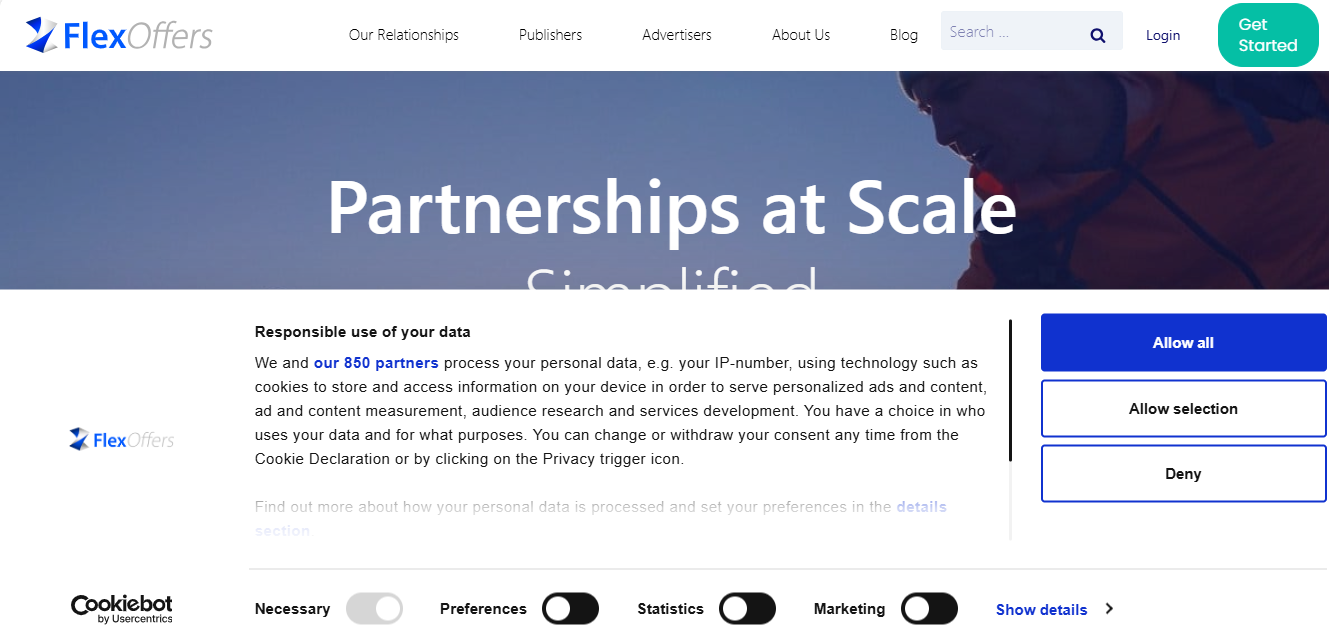 Features
Features
FlexOffers is a leading affiliate marketing network that provides access to a wide range of advertisers across various industries, including software. It offers a comprehensive suite of tools designed to help affiliates maximize their earnings.
Key Features:
- Diverse range of software products available from numerous merchants.
- Real-time reporting tools allow affiliates to track clicks, conversions, and commissions effectively.
- Dedicated account management support for affiliates seeking assistance.
Pros and Cons
Pros:
- Extensive selection of software offerings across multiple niches.
- User-friendly interface makes it easy for new affiliates to get started.
- Reliable payment schedule ensures timely earnings.
Cons:
- Approval required for some programs may delay promotions.
- Commission rates can vary significantly between different merchants.
7. Amazon Associates
Overview and Key Features
Amazon Associates is one of the most recognized affiliate programs globally, allowing affiliates to promote millions of products available on Amazon.com, including various software solutions.
Key Features:
- Extensive product range includes numerous software options across different categories.
- Easy link creation tools allow quick generation of affiliate links for any product on Amazon.
- Trustworthy brand recognition enhances conversion rates among potential customers.
Pros and Cons
Pros:
- High conversion rates due to Amazon’s established trust among consumers.
- Variety of promotional tools available, including banners and widgets.
- Regular payments with multiple options such as direct deposit or gift cards.
Cons:
- Lower commission rates compared to many dedicated software networks (typically ranging from 1% to 10%).
- Strict operating rules must be followed; failure to comply can lead to account suspension.
8. Awin
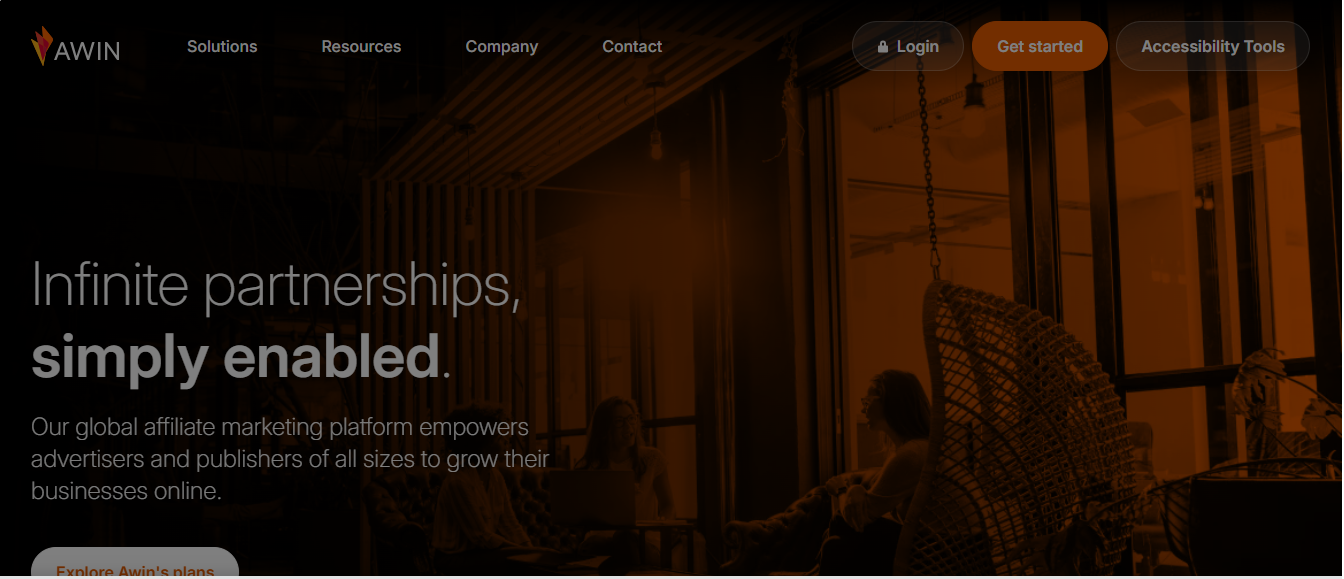
Overview and Key Features
Awin is a global affiliate marketing network that connects brands with publishers across various sectors, including technology and software. It provides robust tools for both advertisers and affiliates.
Key Features:
- Wide range of advertisers offering various software products suitable for different audiences.
- User-friendly dashboard designed for easy navigation by affiliates at all experience levels.
- Comprehensive reporting tools help track performance metrics effectively.
Pros and Cons
Pros:
- Strong international presence allows access to diverse markets for promotion.
- Reliable payment processes ensure timely earnings with multiple payment options available.
- Extensive support resources available for both new and experienced affiliates.
Cons:
- Some programs require approval which might delay promotions initially.
- Higher minimum payout thresholds compared to some competitors (typically $20).
9. AvantLink
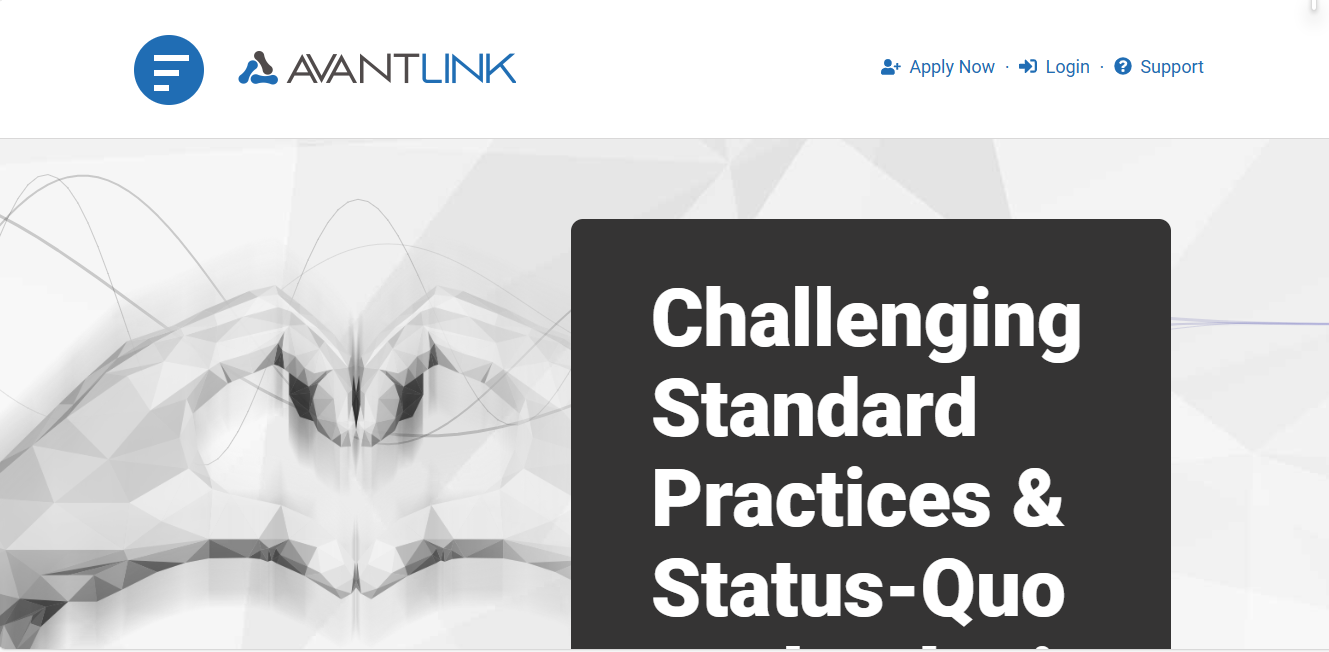
Overview and Key Features
AvantLink is an innovative affiliate marketing network focused on technology-driven solutions for both advertisers and publishers. It provides access primarily in the outdoor gear sector but also includes relevant software offerings within its portfolio.
Key Features:
- Cutting-edge technology provides detailed insights into affiliate performance metrics.
- Quality merchant selection ensures that only reputable brands are represented on the platform.
- Customizable links allow affiliates flexibility in their promotional strategies.
Pros and Cons
Pros:
- Strong focus on quality partnerships enhances credibility among users promoting products through the network.
- Advanced reporting tools provide valuable data insights into campaign effectiveness over time.
Cons:
- Smaller selection of software products compared to larger networks may limit options for some marketers.
10. PeerFly (or another relevant network)
Overview and Key Features:
PeerFly is another CPA-focused affiliate network that has gained popularity among marketers due to its user-friendly interface and diverse range of offers, including various software-related promotions.
Key Features:
- Variety of offers available across multiple niches including technology/software solutions catering towards specific audiences;
- Innovative tracking technology allows real-time monitoring into clicks/conversions generated through referrals;
- Flexible payment options available ensuring ease-of-access when it comes time for payout processing.
Pros And Cons:
Pros:
- Competitive commission rates offered on many high-converting offers;
- Strong community support fosters collaboration amongst peers within the industry;
- Training resources provided help newcomers navigate successfully through challenges they might face early-on in their journey as an affiliate marketer.
Cons:
- Approval required before being able promote certain offers could delay promotional efforts initially.
- Limited international options compared against larger competitors may hinder outreach potential overall depending upon target audience demographics being pursued by individual marketers involved within this space.
How to Choose the Right Network for You
Choosing the right affiliate network is a critical step for anyone looking to succeed in affiliate marketing, especially in the software sector. The right network can enhance your earning potential, provide valuable resources, and connect you with high-quality products that resonate with your audience. Below are key factors to consider based on individual needs when selecting a software affiliate network.
Factors to Consider Based on Individual Needs
Commission Structure
Understanding the commission structure of an affiliate network is paramount. Different networks offer varying commission rates, which can significantly affect your earnings. Look for networks that provide competitive commission rates and flexible payment models.
Types of Commission Structures:
- Pay-per-Sale (PPS): Affiliates earn a percentage of each sale made through their referral link.
- Pay-per-Lead (PPL): Affiliates receive compensation for generating leads—typically when users sign up for free trials or newsletters.
- Recurring Commissions: Some networks offer ongoing commissions for subscription-based products, allowing affiliates to earn money as long as the customer remains subscribed.
Reputation and Reliability
The reputation of an affiliate network can greatly influence your success. A well-established network with positive reviews will likely provide better support and more reliable payments.
Researching Reputation:
- Look for testimonials from other affiliates about their experiences with the network.
- Check online forums and social media groups where affiliates discuss their successes and challenges.
- Evaluate the network’s history, including how long it has been in operation and its growth trajectory.
Range of Products/Services Offered
The variety of software products available through an affiliate network is another important consideration. A broader range allows you to cater to different audience segments and diversify your income streams.
Types of Software Products:
- Productivity tools (e.g., project management software)
- Creative software (e.g., graphic design tools)
- Security software (e.g., antivirus programs)
- Educational software (e.g., online learning platforms)
Ensure that the network you choose aligns with your niche and audience interests, as this will help you promote products effectively.
Support and Resources Available
The level of support provided by an affiliate network can significantly impact its effectiveness:
Types of Support:
- Training Programs: Many successful networks offer training sessions or resources that help affiliates understand best practices in promoting software products effectively.
- Marketing Materials: Access to high-quality banners, text links, and promotional content enhances an affiliate’s ability to drive traffic and conversions.
- Dedicated Account Management: Some networks provide personal account managers who assist affiliates in optimizing campaigns and addressing any challenges they may encounter.
User Interface and Experience
A user-friendly interface is essential for efficiently managing your affiliate activities. Look for networks that offer intuitive dashboards, easy navigation, and clear reporting tools.
An effective user experience will save you time and help you focus on promoting products rather than struggling with technical issues.
Payment Methods and Frequency
Understanding how and when you will be paid is crucial for managing your finances effectively. Different networks have various payment methods and payout schedules.
Payment Options:
- PayPal
- Direct deposit
- Checks
Additionally, consider the minimum payout threshold; lower thresholds allow you to access your earnings more quickly.
Flexibility in Terms of Affiliate Management
As your business grows, you may want to scale your affiliate marketing efforts. Choose a network that allows flexibility in managing multiple campaigns or products under one account.
Look for features that enable easy tracking of different campaigns, allowing you to optimize performance across various offerings.
Integration Capabilities
If you have existing systems such as e-commerce platforms or email marketing tools, ensure that the affiliate network integrates smoothly with these systems. This will streamline your workflow and enhance overall efficiency.
Fraud Protection Measures
Security is vital in affiliate marketing. Choose a network that has robust fraud protection measures in place to safeguard both affiliates and merchants from malicious activities.
Community Engagement Opportunities
Some networks offer forums or community groups where affiliates can share tips, strategies, and experiences. Engaging with a community can provide valuable insights and foster collaboration among affiliates.
Best Practices for Success in Software Affiliate Marketing
Once you’ve chosen the right software affiliate network, implementing best practices can help maximize your success:
Understand Your Audience’s Needs
Conduct research on what topics resonate most with your target audience within the software sector. Create content that addresses their pain points and offers solutions through the software products you promote.
Develop Engaging Content
Create high-quality content that resonates with your audience while effectively promoting software products. Use storytelling techniques to make your content relatable and engaging.
Incorporate Clear Calls-to-Action (CTAs)
Ensure each piece of content includes clear CTAs that guide readers toward taking action whether it’s signing up for a trial or downloading a resource linked through your affiliate link.
Optimize for SEO
Use relevant keywords related to software topics within your content to improve search engine rankings and attract organic traffic.
Utilize Visuals Effectively
Incorporate images, infographics, or videos into your content to enhance engagement and make complex information easier to digest.
Utilizing Social Media for Promotion
Choose the Right Platforms
Identify which social media platforms are most popular among your target audience (e.g., LinkedIn for professionals seeking productivity tools) and focus on those channels.
Create Engaging Posts
Share informative posts about software products while highlighting their benefits; use visuals like images or videos to capture attention.
Engage With Your Followers
Respond promptly to comments or messages on social media; building relationships can lead to higher conversion rates when promoting software products.
Leverage Hashtags Strategically
Use relevant hashtags when posting about software products; this helps increase visibility among users searching for specific topics related to technology solutions.
Run Contests or Giveaways
Organize contests where participants can win free access to premium software; this boosts engagement while generating excitement around the products you’re promoting.
Building an Email List
Create Lead Magnets
Offer valuable resources such as e-books or exclusive webinars in exchange for email sign-ups this incentivizes users interested in technology topics.
Segment Your Email List
Organize subscribers based on their interests (e.g., productivity tools vs design software) so you can send targeted promotions tailored specifically toward their needs.
Send Regular Newsletters
Keep subscribers engaged by sending out regular newsletters featuring updates about new software available through affiliates along with valuable insights related to tech trends.
Personalize Email Campaigns
Personalization helps increase engagement rates; use subscribers’ names in emails and tailor content based on their previous interactions with promoted products whenever possible.
Include Clear CTAs in Emails
Each email should have a clear call-to-action prompting readers toward taking action—whether it’s signing up for a trial or checking out a new resource linked via an affiliate link.
Conclusion
Selecting the right affiliate network is essential for success in software affiliate marketing. By considering factors such as commission structures, reputation, product range, and available support, you can find a network that aligns with your individual needs and goals. With the right network in place, you can maximize your earning potential and effectively promote valuable software products to your audience. Embracing best practices in content creation, social media engagement, and email marketing will further enhance your success in this competitive field.
Frequently Asked Questions (FAQs)
What is a software affiliate network?
A software affiliate network connects software companies with affiliates who promote their products in exchange for commissions. Affiliates earn money by driving traffic and generating sales through their unique referral links.
How do I choose the best affiliate network for my needs?
To choose the best affiliate network, consider factors such as commission structure, the reputation of the network, the range of software products offered, and the level of support available for affiliates.
Can I promote multiple software affiliate networks at once?
Yes! Promoting multiple software affiliate networks allows you to diversify your income streams and reach different audience segments effectively, maximizing your earning potential across various platforms.

